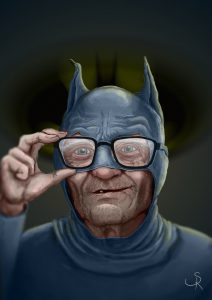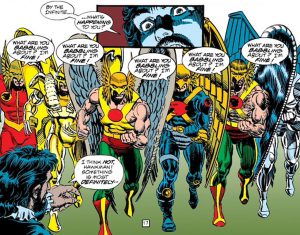From Mav: We haven’t really done an episode that focused on comics in while. This one doesn’t entirely FOCUS on comics, but that’s where we started. It’s also academic… or at least, it’s a part of my dissertation, so let’s just say it is. And maybe it’s a little controversial… at least to comic book fans, which hopefully makes it kind of fun. A common argument from any comic book fan is trying to figure out the “real continuity” of a character or shared universe. Particularly with DC Comics (also with Marvel, but particularly with DC), because of their habit of constantly rebooting their universe with Infinite Crisises (I know it should probably be Crises, but I don’t like that as much). This has spilled over into the film and television universes. You find people posting timelines on message boards… trying to figure out how MCU films interact with each other… trying to explain away seeming errors. There are whole books written about it. So here’s my big bold claim hot take claim: I don’t care about continuity… and neither do you!

Continuity is a big thing in discussions amongst comic nerds. Since comics from the big two have been published for eighty years in a continuous shared universe where each story is — at least in theory — a single continuous thread that follows from the others. Of course this is quite true. It gets complicated because in 80+ years of continuous storytelling we have ended up with characters like Batman, who has appeared in 16,743 separate stories. Even if we assume that each story only represents an average of one day’s time passage, that’s more 45 years of continuous adventures. The character just can’t have lived as much life as his publications imply.
And you can’t read it! I would argue that there is no single person walking the Earth today that has read all 16,743 Batman comics… and since there’s always more being published, no one ever will. It’s just impossible to absorb the entire thing.
But, I also don’t think it matters. I saw a misleading clickbaity headline from CBR earlier today that said “The MCU Is Basically Wiping Spider-Man’s Uncle Ben From Existence”. Of course, they aren’t. What the article is actually about is that Kevin Feige pointed out that they didn’t feel the need to explain Uncle Ben’s death in Spider-man: Homecoming because they figured pretty much everyone already knew it and could fill in the blanks so why waste time. But honestly, it DOESN’T matter. They don’t start every issue of Amazing Spider-man with a recap of Amazing Fantasy #15. Spider-man and his Amazing Friends didn’t start with an episode explaining Uncle Ben or Spidey’s origin. They just talked about it when they needed it. And most of the time it doesn’t matter. All that matters is that the reader has enough information on who the character is to get to where THIS story begins. I started reading Spider-man comics in the early 1980s… I’ve since went back and read stuff from before I was born. But it’s not like I was lost by jumping in to the middle of a storyline. I had enough understanding of who and what Spider-man was about to follow along… some of that came from cartoons, some from the 1970s movies. Some from The Electric Company. It was fine.

And you do too! One of my favorite mashup videos ever was a supercut mashup of all of the many onscreen deaths of Thomas and Martha Wayne. It’s fun to watch and compare the differences between them. But what makes it really work for me is that it kind of highlights that the minor distinctions don’t really matter. It doesn’t matter what movie Bruce and his parents were seeing before they were killed. It doesn’t matter if the killer was Joe Chill or Jack Napier. So long as you understand the base narrative of Batman you can jump from the comics to any of the film series to the cartoon to the video games and more or less be fine. The Lego Batman movie utilizes this to very great effect as does the recent Spider-man: Into the Spider-verse film.
And I feel like that happens in other media as well. Video game franchises are almost all multiple choice. Even something as simple as fighting games. Every game in the Tekken, Street Fighter or Mortal Kombat series can all end with any given character winning their individual tournament. The next game starts with an official narrative assuming one of the previous characters won… but it doesn’t really matter. We just adapt. We deal with it and we move on.
And I feel like that’s just how we watch convoluted shared universe media. We don’t care about the differences between portrayals of Hercules in classic mythology vs. Disney vs. Schwarzenegger… and we don’t REALLY care about the differences in portrayals of Batman or Spider-man. Continuity “errors” are just going to naturally appear in any long form episodic story like this… especially if written by multiple authors. Any official attempts to “fix things” usually just introduce more incompatibilities (DC Comics Zero Hour, anyone? Hawkman has never recovered). Last week, DC Comics brought back the comic book Young Justice, one of my longtime favorites. After the last several years of DC doing everything they could to simplify their continuity and “make everything work” with Flashpoints, Infinite Crisises, New 52s and Rebirths and whatever… The new Young Justice seems to just ignore it all and tell the story that it wants to tell. These are the characters… this is how the author sees them… and whatever doesn’t work… fuck it. And I think that’s what we all do. We just fix them in our own head canons and we move on.
Or at least that’s my theory. I’m really interested in opening this one up for conversation. Not just comics… but anything. James Bond is an ongoing narrative in several media types and continuity inside of it is just completely variable. Same thing goes with the Wizard of Oz… Hell, what is the true story of Pac-man? How much does continuity matter in continuous narratives? When does it matter? When does it not? Why do we care at all? And what other stories do you think make a difference. Let us know if you have thoughts that we can address on the show.






Ok, so, Wayne Wise knows I obsess a bit over continuity. My reasoning is for honoring commitment. I like to revisit characters and stories and see the impact of consequences. Certain events cue up other events, and that’s why continuity is important to me. When you adapt and reboot, depending on what you change effects the possibility of future events. I.e Spider-Man’s symbiote suit, Venom, Carnage, Agent Venom. Reboots are fine if they acknowledge that too much deviation can hinder where you can go in respect to the source material. Star Trek’s 2009 honored the past by establishing events from the TNG episode Unification and the movie Nemesis provided the Romulans and Spock a reason to go back in time and create the Kelvin timeline. The Transformers Aligned continuity (not the movies thankfully) went out of its way to make previous takes all exist within the same universe, just like the 2012 Ninja Turtles did. In the end, I’d say there’s also a financial impact to handling of continuity- which shows and movies count will effect what the consumer will feel a need to buy. The DC animated movies were frustrating until the New 52 kicked in, now those entries all inform the next, which encourages me to rewatch.
As the example that Wayne cited (Aunt Petunia from “Fantastic Four”), I notice when things are out of continuity. I notice when Cyborg becomes part of the Justice League with no acknowledgement of the Wolfman/Perez Titans continuity. And I understand the issue about honoring a commitment.
However, I can’t let it distract me too much, or I’d never read comics again – or anything from the big publishers, at least. It’s a little easier to expect a creator owned title under consistent creative management by the same creator(s) over time to maintain the continuity that they’ve set up (“Mage” for example – but even that’s spanned so much many years that some lapses in continuity can be expected).
You dealt with this issue on the podcast, but the question should be asked – WHO made the commitment (to be honored)? In many cases, we’re talking about a writer who moved on decades ago. I get the feeling that most editors don’t exert the power that they once did (e.g.; Archie Goodwin), and beyond that in the food chain, there’s no real commitment to anything beyond selling books. Nor should there be.
I tend to view continuity in two categories: Continuity (Big “C”) and continuity (little “c”). Continuity (Big C) impacts characters and titles beyond the titular one (such as the earlier example of Cyborg) and continuity (little c) is often the “little white lies” we ignore that allow the story to stay on track, such as Bruce Wayne’s age (if we acknowledge all of the Robins, they must’ve all cycled through in rapid succession).
Sometimes a skilled creator/team can play with continuity to great impact. The best example that I can think of is the introduction of Dawn in Season Five of “Buffy the Vampire Slayer.” Perhaps there are good examples from comics, but I think that this was easier to accomplish with a property that was under one singular control.